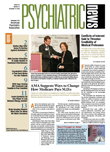Almost every physician agrees that the way that the Medicare program pays doctors needs to be changed.
How to do it, exactly, is the point of contention.
The AMA at its meeting in Orlando in November approved a report by its Council on Medical Services (CMS) outlining four options for reforming the Medicare payment formula.
John McIntyre, M.D., chair of the AMA Section Council on Psychiatry and a CMS member, said the council is seeking input from state and specialty medical societies about four options prior to its meeting next month and will then prepare a report for the AMA House of Delegates' Annual Meetting in June 2009. APA's Office of Healthcare Systems and Financing, in collaboration with relevant councils, will review the report and provide comments to CMS.
The four options—bundled payments, gainsharing, the medical home, and pay for performance—are being seriously considered by health care policymakers, McIntyre said.
The CMS report described each of the four options and outlined advantages and disadvantages of each in text and in table form. Following is a brief overview of the options as described in the CMS report:
• Bundled payments: Under a bundled-payment approach, a single payment is made for an array of health care services. The services could relate to the activities of a single physician (or other provider) or to services provided by multiple physicians and providers. The bundle could, for example, include services provided by a hospital during a Medicare beneficiary's inpatient stay, as well as the services of the operating surgeon, the anesthesiologist, and even consulting physicians. The bundle could include all services provided 30, 60, or 90 days following discharge. Alternatively, the bundle could relate solely to services provided by a physician, or physicians, on an ambulatory basis. The bundle could be defined on a monthly or other time-related basis, or it could be defined on an episode-of-care basis.
• Gainsharing (also referred to as “shared savings” or “shared accountability”): In this approach, hospitals share with physicians the savings produced as a result of changes in care processes. Gainsharing is seen as having the potential to align hospital and physician incentives to provide more cost-effective care, for example, by encouraging more appropriate use of imaging and testing services, more careful choice among available generic and brand-name drugs, reductions in medication errors, use of outpatient rather than inpatient services, use of disease-management services to preclude the need for hospital admission, and reduction of avoidable readmissions. Gainsharing is often a component of the bundled payment approach.
• Medical home: Concerns about inadequate coordination of patient care have led to calls for a new organizational and payment model known as the medical home. Four organizations, the American Academy of Family Physicians, the American Academy of Pediatrics, the American College of Physicians, and the American Osteopathic Association, have published“ Joint Principles of the Patient-Centered Medical Home.” Under these principles, the medical home takes responsibility for arranging care; makes effective use of HIT to monitor, coordinate, and manage patient care; provides enhanced access to care through open scheduling, expanded hours, and new communication options; and undergoes a voluntary recognition process by some nongovernmental entity.
The medical home, as a financing mechanism for the Medicare program, is distinct from the concept of a medical home as a way of coordinating a patient's care, which was approved by the House of Delegates in a separate resolution (see
AMA Backs 'Medical Home' Despite Specialists' Concerns). During debate on that resolution, delegates emphasized that they were endorsing the concept of coordinating a patient's care through a central medical home, but were not endorsing a specific financing structure.
• Pay for performance (P4P): The P4P concept continues to attract attention as a means to establish incentives for meeting quality and/or efficiency benchmarks, including patient satisfaction measures, or for other actions or behaviors, such as the adoption and effective use of health information technology. To date, the AMA's Physician Consortium for Performance Improvement has developed approximately 215 performance measures that are available for implementation.
Psychiatric News has published multiple reports on P4P (July 20, 2007; December 15, 2006; December 2, 2005).
The four options are more fully described in the CMS report“ Emerging Medicare Physician Payment Methodologies,” posted at<www.ama-assn.org/ama1/pub/upload/mm/475/i08refcommj.pdf>.▪
